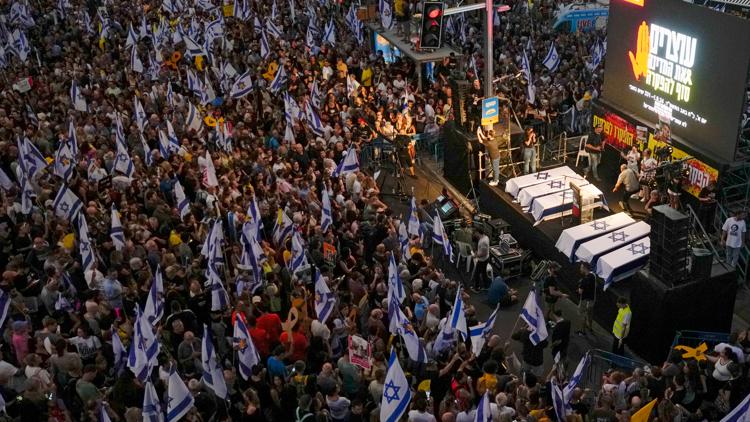
The Urgency of a Cease-Fire: Israel’s Largest Trade Union Calls for Strike
In a powerful display of grief and anger, tens of thousands of Israelis took to the streets after the discovery of six more hostages’ deaths in Gaza. Their unified cry for a cease-fire with Hamas echoed through the city, demanding the safe return of the remaining captives.
This mass outpouring of emotion marked a potential turning point in the 11-month-long conflict, as protesters expressed a deep sense of betrayal and frustration. With the country divided, Israel’s largest trade union, the Histadrut, has called for a general strike on Monday to further pressure the government and escalate demands for a resolution.
Cease-fire negotiations have been ongoing for months, with growing discontent towards Prime Minister Benjamin Netanyahu for his failure to secure a deal. While some support his strategy of “total victory” against Hamas, the majority of Israelis are calling for immediate action to bring the hostages home.
Amidst the ongoing turmoil, the heartbreaking news that three hostages, including an Israeli-American, were set to be released in July but tragically lost their lives has fueled the protesters’ fury even more. The community is united in its grief, with families of the victims demanding justice and accountability from the government.
The recent discovery of the hostages’ bodies has only intensified the urgency for a resolution, highlighting the devastating toll of the conflict on innocent lives. As the nation mourns the loss of the six brave individuals, the demand for peace and justice grows stronger.
Hope for Resolution Amidst Political Divides
As Israel grapples with internal divisions and external pressures, the path to peace remains uncertain. Netanyahu’s pledge to continue fighting until Hamas is destroyed has sparked controversy and criticism, leading to calls for his resignation.
While the military acknowledges the need for a cease-fire to ensure the safe return of hostages, critics accuse the government of prioritizing political interests over humanitarian concerns. The public outcry over the hostages’ deaths has exposed deep-rooted tensions within the government, raising questions about accountability and transparency.
Amidst these challenges, the families of the hostages have emerged as powerful advocates for peace, demanding swift action and justice for their loved ones. Their high-profile campaign has garnered international support, with world leaders expressing solidarity and condemnation for the senseless loss of life.
As the nation mourns the tragic deaths of the six hostages, the call for a cease-fire grows louder, echoing through the streets of Israel. The time for peace is now, and the collective voices of the people demand action. It is a pivotal moment in the nation’s history, as hope for resolution shines through the darkness of conflict.




